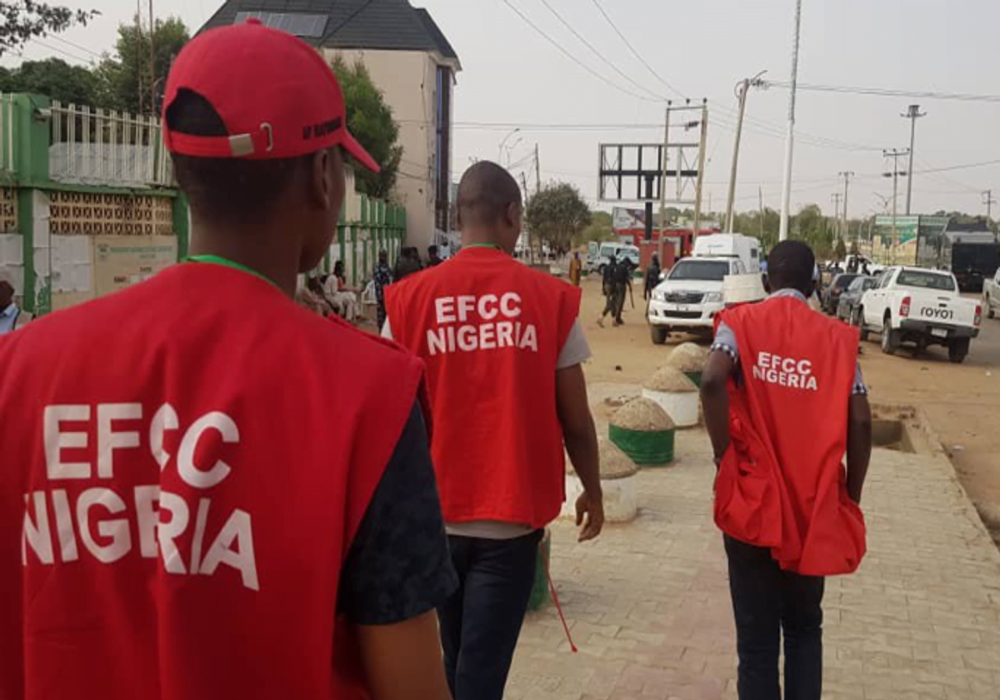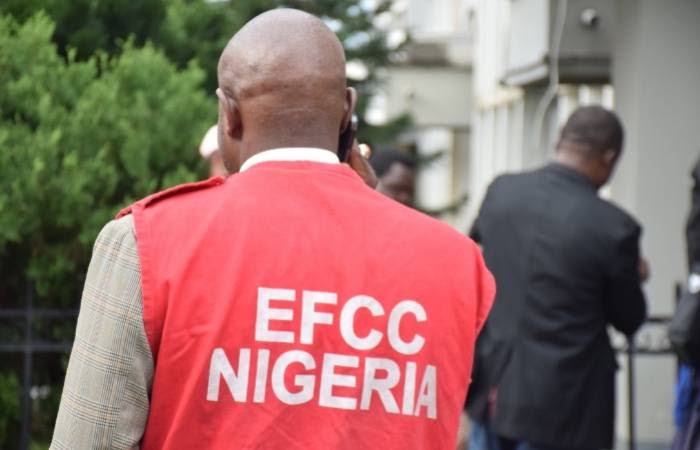Crime
Anambra Police Arrests Vigilante Member Over Firearms Smuggling Allegations
The Anambra State Police Command has arrested a vigilante operative attempting to flee with a firearm concealed in a bag of rice.
The incident occurred on Friday, November 22, at Nkwelle-Ezunaka in Oyi Local Government Area of Anambra State.
Police spokesperson SP Tochukwu Ikenga, in a statement on Tuesday, disclosed that the suspect, 25-year-old Enediong Bassey, was apprehended by officers from the 3-3 Police Divisional Headquarters, led by CSP Emeka Obi.
READ MORE: JUST IN: Port Harcourt Refinery Begins Crude Oil Processing
Bassey, a native of Ikono Local Government Area in Akwa Ibom State, was caught with a pump-action gun during the operation.
“Police operatives acting on credible information arrested Enediong Bassey and recovered one pump action gun wrapped in a bag of rice at Nkwelle-Ezunaka,” Ikenga said.
“During interrogation, the suspect admitted to being a member of a vigilante group but confessed that he was absconding with the weapon to join a criminal gang for armed robbery and other unlawful activities.”
Ikenga noted that the arrest reflects growing concerns over misconduct by some members of vigilante groups in the state.
As a result, the Commissioner of Police, Nnaghe Obono Itam, has emphasized the need for stricter oversight of such operatives.
“Given the above and following other complaints and unprofessional conduct by some security outfits and vigilante members, the Commissioner of Police, in line with the principles of community policing, reiterates the calls for profiling of security operatives assisting the Police and other security agencies on anti-crime operations to improve safety in the state,” Ikenga stated.
The commissioner has also directed the immediate transfer of the suspect to the command’s anti-robbery squad for comprehensive investigations.
Crime
Couple Impersonates Katsina First Lady, Defrauds Victims Of N197m

A couple, Baba Sule Abubakar Sadiq and Hafsat Kabir Lawal, along with two accomplices, Abdullahi Bala and Ladani Akindele, have been arraigned before Justice Amina Bello of the Kaduna State High Court on charges of fraud, money laundering, and stealing totaling N197,750,000.
The Economic and Financial Crimes Commission (EFCC) brought the defendants before the court on Monday, March 9, 2025, on a six-count charge.
They are accused of conspiring to defraud victims by impersonating the wife of the Katsina State Governor, Fatima Dikko Radda, and offering fake foreign exchange deals.
According to the EFCC, Hafsat Kabir Lawal allegedly posed as the Katsina First Lady to lure victims into fraudulent currency exchange transactions.
READ ALSO: Tragic End: Abducted Catholic Priest Killed In Kaduna
Using SIM cards registered under the name “Fatima Dikko Radda” on True Caller, she reportedly contacted a bureau de change operator, Aminu Usman, and convinced him to transfer N89 million in exchange for $53,300.
Investigators further revealed that another victim was defrauded of N108 million under a similar scheme involving a supposed exchange of $118,300.
The funds were allegedly deposited into the bank account of the third defendant, Abdullahi Bala, before being laundered and shared among the conspirators.
Hafsat’s husband, Sadiq, is accused of providing the SIM cards used in the fraud. He allegedly enlisted the help of Ladani Akindele, a former bank colleague, to secure the contact details of Unity Bank Chairman Hafiz Bashir. The contact was then used to gain the trust of the victims.
When the charges were read, all four defendants pleaded not guilty. Prosecution counsel Bright C. Ogbonna requested a trial date and urged the court to remand them in a correctional facility.
Defense counsels, led by M.S. Katu (SAN), argued for bail, stating they had already filed applications.
However, the prosecution opposed the requests, stating that the applications were not yet ready for hearing. When the defense requested an oral bail application, Justice Bello ruled in favor of the prosecution and ordered the defendants to remain in custody.
The case was adjourned to March 17, 2025, for the hearing of bail applications.
The suspects were initially arrested by the Department of State Services (DSS) before being handed over to the EFCC when the case was determined to be financial in nature.
The EFCC has vowed to ensure that justice is served in the case, emphasizing the need for vigilance against fraudulent schemes involving high-profile impersonation.
Crime
JUST IN: VDM In Trouble As Court Issues Arrest Warrant
A Chief Magistrate Court sitting in Wuse Zone 6, Abuja, has issued a bench warrant for the arrest of controversial social media activist, Martins Otse, popularly known as VeryDarkMan (VDM), over allegations of criminal defamation.
The arrest order, issued on Thursday by Magistrate Emmanuel Iyana, follows a criminal defamation case brought against VDM by renowned gospel singer Mercy Chinwo.
READ ALSO: Only A Fool Would Destroy What God Has Built – EeZeeTee Fires Back At Mercy Chinwo
The court mandated the Nigeria Police Force and other law enforcement agencies to apprehend the activist and present him before the court to face the allegations.
VDM was accused of making defamatory statements about Chinwo on social media, alleging her involvement in a contractual dispute and the diversion of $345,000 linked to her former record label boss, Ezekiel Onyedikachukwu, also known as Eezee Tee.
Chinwo, who denied the claims, presented documentary evidence—including emails and payment receipts—to support her innocence.
Despite being summoned by the court to appear on March 5, VDM failed to honor the directive.
His counsel, Mr. Deji Adeyanju, pleaded with the court to allow him to produce his client at the next adjourned date, but the magistrate declined and upheld the arrest order.
The prosecution, led by Mr. Pelumi Olajengbesi, argued that VDM’s actions violated Section 391 of the Penal Code and Section 24(1)(B) of the Cybercrime (Prohibition, Prevention, etc.) Act 2015.
In addition to the criminal case, Chinwo has also filed a separate N1.1 billion lawsuit against VDM at the High Court of the Federal Capital Territory, Abuja.
She is seeking a court order compelling him to retract his statements, delete all defamatory posts, and issue a public apology.
Crime
Ponzi Alert: EFCC Exposes 58 Fake Investment Companies

With the rise of fraudulent investment schemes preying on unsuspecting Nigerians, the Economic and Financial Crimes Commission (EFCC) has issued a strong warning about the activities of 58 unregistered companies defrauding citizens under the guise of investment opportunities.
In a statement on Tuesday, the EFCC’s Head of Media and Publicity, Dele Oyewale, revealed that these companies operate without approval from the Central Bank of Nigeria (CBN) or the Securities and Exchange Commission (SEC), making their activities illegal.
The anti-graft agency disclosed that legal action has already been taken against several of these entities, with five convictions secured and another five suspects pleading guilty while awaiting further judicial proceedings.
READ ALSO: EFCC Grills Ex-Minister Uju Ohanenye Over ₦138m Fraud Allegations
Many more cases are still pending arraignment.
“To protect Nigerians from financial exploitation, the EFCC is drawing public attention to 58 companies masquerading as investment firms but deceiving innocent investors,” the statement read.
According to the EFCC, the following companies have been identified as fraudulent investment platforms: Wales Kingdom Capital, Bethseida Group of Companies, AQM Capital Limited, Titan Multibusiness Investment Limited, Brickwall Global Investment Limited, Farmforte Limited & Agro Partnership Tech, Green Eagles Agribusiness Solution Limited, Richfield Multiconcepts Limited, Forte Asset Management Limited, Biss Networks Nigeria Limited, S Mobile Netzone Limited, Pristine Mobile Network, Letsfarm Integrated Services, Bara Finance & Investment Limited, Vicampro Farms Limited, Brooks Network Limited, Gas Station Supply Services Limited, Brass & Books Limited,
Others includes; Annexation Biz Concept & Maitanbuwal Global Ventures, Crowdyvest Limited, Jadek Agro Connect Limited, Adeeva Capital Limited, Oxford International Group & Oxford Gold Integrated, Skapomah Global Limited, MBA Trading & Capital Investment Limited, TRJ Company Limited, Farm4Me Agriculture Limited, Quintessential Investment Company, Adeprinz Global Enterprises, Rockstar Establishment Limited, SU.Global Investment, Citi Trust Funding PLC, Farm Buddy, Eatrich 369 Farms & Food, Globertrot Farmsponsors Nigeria Limited, Farm Sponsors Limited, Cititrust Credit Limited, Farmfunded Agroservices Limited, Adamakin Investment & Works Limited, Cititrust Holding PLC, Green Eagles Agribusiness Solutions Limited, Chinmark Homes & Shelters Limited, Emerald Farms & Consultant Limited, Ovaioza Farm Produce Storage Limited,
Additionally, Farm 360 & Agriculture Company, Requid Technologies Limited, West Agro Agriculture & Food Processing Limited, NISL Ventures Limited & Estate of Laolu Martins, XY Connect Investment Limited, River Branch Unique Investment Limited, Hallmark Capital Limited, CJC Markets Limited, Crowd One Investment, Farmkart Foods Limited, KD Likemind Stakeholders Limited, Holibiz Finance Limited, Ifeanyi Okpe Oil & Gas Services, Servapps Nigeria Limited were also listed.
The EFCC warned that these firms lure investors with promises of unrealistic returns, only to defraud them.
Nigerians were urged to verify investment opportunities with the CBN and SEC before committing funds.
The commission also encouraged victims of these schemes to come forward with complaints, assuring them that efforts were ongoing to recover lost funds where possible.
“The EFCC remains committed to creating a safe and corruption-free financial environment. We strongly advise the public to conduct due diligence before investing in any financial scheme,” the statement concluded.



















